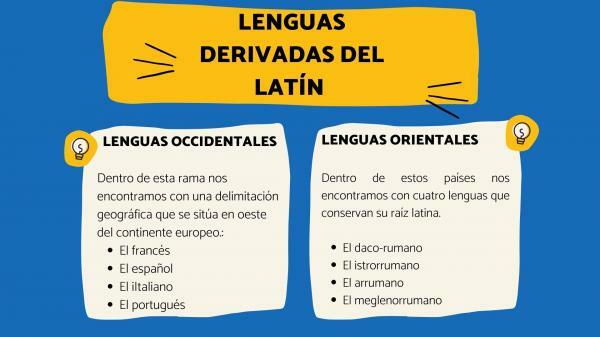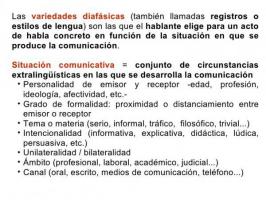Languages derived from Latin

The romanization was a very important historical process, by which Rome imposed its power in a wide territory of the world. As a consequence of this Romanization, the inhabitants of the conquered towns were acquiring the customs, systems and language of the Romans. For this reason, many of the languages we speak today have a common root. In this lesson from a TEACHER we are going to offer you a summary of languages derived from Latin.
Latin was the official language of the Roman Empire. It was born as a dialect in the Lazio region of central Italy, but its evolution gradually led to it being used massively by the Romans. Latin spread throughout the empire as its armies did, and we can find two variants in it:
- Classical latin: It was used mainly in administration and politics.
- Vulgar latin: it was used by the conquered peoples.
The vulgar form of Latin survived beyond the fall of the empire contributing to the appearance of new variations that will give rise to the languages derived from it. These languages are known as Romance languages which, together with variations and mixing with other languages, have given rise to the languages we use today.
Latin and Romance languages
Most of the people in the world speak Romance languages and these can be categorized into two geographical areas:
- Western Romance Languages
- Eastern Romance languages.
We can say, therefore, that after the fall of the Roman Empire, they went from speaking a practically unified language to many languages that kept their Latin root, but that acquired different variables when being in contact with other languages and peoples. That is, due to historical events, wars and conquests, the language keeps changing until giving rise to the different languages, which still retain a common root and which comes from the primitive Latin.
Today, Latin can be considered as a dead tongue, since It is not officially spoken by any country. It is true that we know its grammar, its syntax and its vocabulary and that we still have many expressions. These above all have to do with specific subjects or branches of knowledge that use this type of cultism when writing texts.
It is common that in a text we can find the expression ad hoc, to refer to the fact that a certain action has been tailored to the case and many other examples that we can find on a daily basis.
First of all we are going to base ourselves on the classification made previously to start with the most important western languages.
Western Latin derived languages
Within this branch we find a geographical delimitation that is located in the west of the European continent. That is, the area comprised by France, Spain, Italy and Portugal. Therefore the languages from Latin within this branch would be:
- The French
- The Spanish
- The Italian
- Portuguese
Oriental Latin derived languages
For their part, the languages that come from Latin in the Eastern Europe they will have to do with the languages spoken mainly in two countries: Romania and Moldova. Within these countries we find four languages that retain their Latin roots. These languages are:
- Daco-romanian
- The Istro-Romanian
- The Aromanian
- The meglenoromanian
Next we will see some examples of words and how they are spelled in different languages. In addition to the original Latin word. In this way you will be able to verify that all of them are variations of the same language:
For example if we focus on the word LinguaIn Latin, we will see the following variations:
- Lingua (Italian)
- Spanish language)
- Limbǎ (Romanian)
- Lingua (Portuguese)
- Langue (French)
As you can see, the variations they present are very small and in languages such as Italian or Portuguese the same Latin form is preserved.
Let's see another example with the word Night In latin. Translated into the same languages it would be as follows:
- Notte (Italian)
- Night (Spanish)
- Noapte (Romanian)
- Noite (Portuguese)
- Nuit (French)
If we take the Latin word as an example key code. This will be transformed in the different languages as follows:
- Chiave (Italian)
- Key (Spanish)
- Cheie (Romanian)
- Chave (Portuguese)
- Clé (French)
Another example could be the word orchestra In latin, which would become the following words in the different languages we are dealing with:
- Piazza (Italian)
- Plaza (Spanish)
- Piaţǎ (Romanian)
- Praça (Portuguese)
- Place (French)
As you can see, there are many similarities in the way the different words are written in these languages. This indicates that the process of Romanization made Latin was considered the language of the peoples conquered and that, therefore, the languages that were born after the fall of the Roman Empire were based on the Latin. If you want to find more articles like this one on languages derived from Latin, be sure to visit our section on Spanish language.



